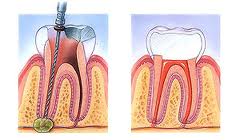During my root canal in March, my dentist told me that the tip of his file broke off and fell into the canal. He said the file is sterile, so he wasn’t going to damage my tooth and try to remove it. He said he would put a post in the tooth and put a crown on it.
I asked him to place a temporary crown until I think about what I want to do with the tooth. I haven’t been able to return to the dentist yet. Is it okay to leave the tip of the file inside my tooth? Lots of people go to this dentist because his fees are lower than others, but I don’t want cheaper care if it means a dentist will be careless. Thanks. Jules
Jules,
Metal files can break easily, and it’s happened to a lot of dentists—even those who don’t have lower fees for services. A broken piece of a file can be challenging to remove for many general dentists. If the tip of the file is left, a dentist would need to navigate around it and seal the apex or tip of the tooth root. If the broken piece is blocking the apex, it decreases the chances of successful root canal treatment.
If the tip of the instrument irritates your tooth, you might need root canal treatment later. Cementing a post could make it impossible to retreat the tooth.

Your safest option is to ask your dentist to refer you to an endodontist, or root canal specialist. Endodontists have special tools to extract the tip of the file and fill the canal of the tooth. Although your dentist might not want to refer you to a specialist, you can insist on it or find an endodontist on your own. It’s good that you asked for a temporary crown until you decide what to do about the tooth. Don’t risk losing your tooth. Visit an endodontist.
This post is sponsored by Plano, TX female dentist Dr. Miranda Lacy.
